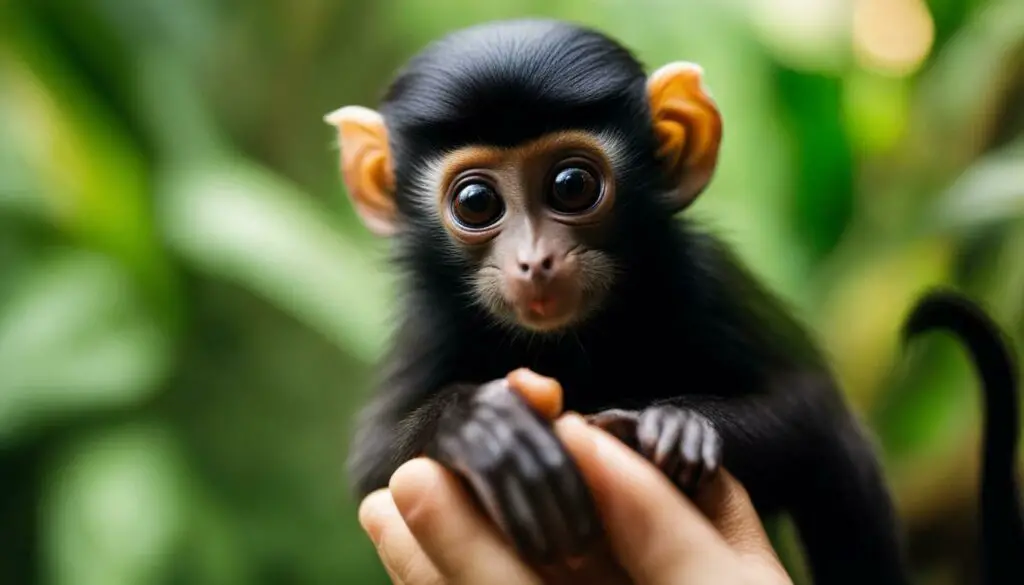Are you considering getting a pet finger monkey? In this article, we will explore the care, cost, and important considerations involved in owning these adorable primates.
Key Takeaways:
- Pet finger monkeys, also known as pygmy marmosets, are the smallest species of monkeys and one of the smallest primates in the world.
- Finger monkeys are social creatures that live in small groups in the treetops of South American rainforests.
- Before owning a pet finger monkey, it is important to check the legality of owning primates as pets in your state and ensure you have the necessary licenses or permits.
- Creating a suitable habitat for a finger monkey involves providing a large cage with trees, vines, and swings for climbing and playing.
- These primates are social animals and should be kept in pairs or groups to fulfill their social needs.
What are Pet Finger Monkeys?
Pet finger monkeys, also known as pygmy marmosets, are the smallest species of monkeys and one of the tiniest primates in the world. They are native to the treetops of South American rainforests. These adorable creatures have captured the hearts of many animal lovers due to their small size, unique appearance, and fascinating behaviors.
“Finger monkeys are incredibly fascinating creatures to observe. They are known for their small size, adorable facial expressions, and agile movements in the treetops. It’s like having a tiny acrobat in your home!” – Jane Peterson, Finger Monkey Enthusiast
Standing at just 5-6 inches tall and weighing around 3-5 ounces, finger monkeys have a body length of approximately 4-5 inches, with their long tail measuring up to 7-8 inches. Their small size allows them to easily navigate through the dense vegetation of their rainforest habitat.
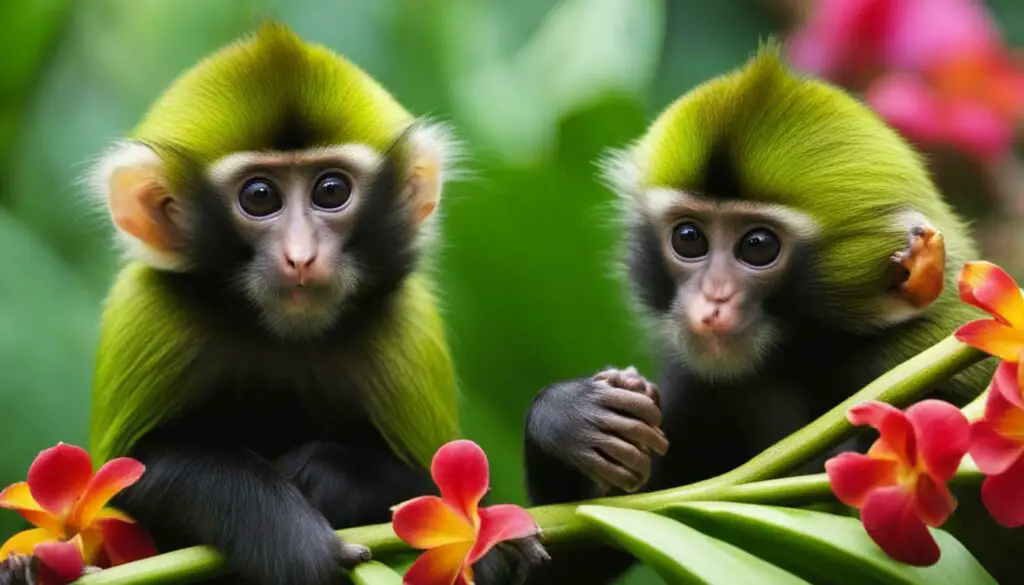
As highly social animals, finger monkeys live in small groups of 2 to 9 individuals, consisting of an adult breeding pair and their offspring. They use loud vocalizations and scent marking to communicate with each other and establish their territories in the treetops. These monkeys have specialized adaptations, such as sharp claws and long prehensile tails, which enable them to climb and leap effortlessly from branch to branch.
The Fascinating Behavior of Finger Monkeys
Finger monkeys exhibit a range of interesting behaviors. They are diurnal, meaning they are active during the day and rest at night. Their diet primarily consists of tree sap, gum, fruit, nectar, small insects, and spiders. They have specialized dental adaptations that allow them to feed on tree sap by gnawing small holes in the bark with their sharp incisor teeth.
These tiny primates are known for their strong familial bonds and cooperative behaviors. Within their groups, they engage in mutual grooming, infant care, and even share food among each other. This social structure helps them navigate the challenges of their rainforest environment and ensures their survival in the wild.
With their captivating charm and unique characteristics, it’s no wonder that pet finger monkeys have become a popular choice for exotic pet enthusiasts. However, it is crucial to recognize the responsibility and commitment required to care for these intelligent creatures and provide them with a suitable environment that mimics their natural habitat.
Legality of Owning Pet Finger Monkeys
Before bringing a pet finger monkey into your home, it’s crucial to determine the legality of owning one as a pet in your state and whether any special licenses or permits are required. The rules and regulations regarding pet primates vary from state to state, and it’s important to comply with the law to ensure the well-being of both the animal and the owner. Some states prohibit the ownership of primates altogether, while others have specific requirements that must be met.
To find out if you can legally own a pet finger monkey, start by contacting your state’s Department of Fish and Wildlife or Department of Agriculture. They will have the most up-to-date information on the laws surrounding exotic animals and can guide you on the necessary permits or licenses. It’s essential to follow the proper channels and obtain any required documentation before bringing a finger monkey into your home.
Additionally, it’s essential to consider the ethical implications of owning a pet finger monkey. These animals are highly intelligent and social creatures, and their natural habitat is the lush rainforests of South America. The pet trade, unfortunately, contributes to the illegal wildlife trafficking industry and can have detrimental effects on wild populations. It’s important to ensure that any pet finger monkey you acquire has been legally and ethically sourced.
| State | Legal Status | Permits/Licenses |
|---|---|---|
| California | Illegal | N/A |
| Texas | Legal with permits | Texas Parks and Wildlife Department |
| New York | Illegal | N/A |
| Florida | Legal with permits | Florida Fish and Wildlife Conservation Commission |
| Arizona | Legal with permits | Arizona Game and Fish Department |
It’s essential to remember that owning a pet finger monkey is a serious commitment. These primates require specialized care, an adequate living environment, and proper socialization. Before bringing one into your home, make sure you are prepared to meet their unique needs and provide them with a safe and enriching environment.
Creating a Suitable Habitat
Providing a suitable habitat is essential for the well-being of a pet finger monkey. They need a spacious cage with plenty of trees, vines, and swings for them to climb and play on. Creating an environment that mimics their natural habitat in South American rainforests is crucial for their physical and mental health.
A large cage or enclosure with dimensions of at least 3 feet wide, 3 feet deep, and 4 feet tall is recommended for a single finger monkey. However, it is even better to provide a larger enclosure if possible, as finger monkeys are highly active and curious creatures. They need plenty of space to explore and swing from branch to branch.
To create a stimulating and enriching environment for your pet finger monkey, consider adding various elements such as tree branches, ropes, and swings. These elements provide opportunities for climbing, swinging, and jumping, which are vital for their physical exercise. Additionally, the cage should have hiding spots and platforms at different levels to encourage their natural behavior of exploring their surroundings.
| Type of Enrichment | Description |
|---|---|
| Tree branches | Provide sturdy branches for climbing and perching. |
| Ropes and swings | Add ropes and swings to simulate tree branches for them to swing on. |
| Hiding spots | Include small caves or nesting boxes for them to hide and feel secure. |
| Platforms at different levels | Install platforms at different heights to encourage exploration and exercise. |

Creating a suitable habitat for your pet finger monkey is crucial for their well-being. Not only does it provide them with the physical exercise they need, but it also ensures their mental stimulation. Remember to regularly assess and update the habitat to keep it interesting and engaging for your furry friend.
By providing a spacious and enriching habitat for your pet finger monkey, you are allowing them to thrive in a setting that closely resembles their natural environment. It is essential to prioritize their needs for climbing, swinging, and exploring to ensure their physical and mental health. Taking the time and effort to set up an ideal habitat will greatly contribute to the overall happiness and well-being of your pet finger monkey.
Social Needs of Pet Finger Monkeys
Pet finger monkeys are highly social creatures and thrive when kept in pairs or groups. Meeting their social needs is crucial for their overall happiness and well-being. These tiny primates are known for their strong bonds and cooperative behavior within their groups, which helps them navigate their natural habitat and ensure their safety.
When kept in captivity, it is important to replicate their natural social environment as closely as possible. This means providing them with companionship from their own species. Having a companion not only prevents loneliness but also promotes mental stimulation, physical activity, and emotional well-being. A lonely finger monkey can become stressed or exhibit behavioral problems such as aggression or self-harm.
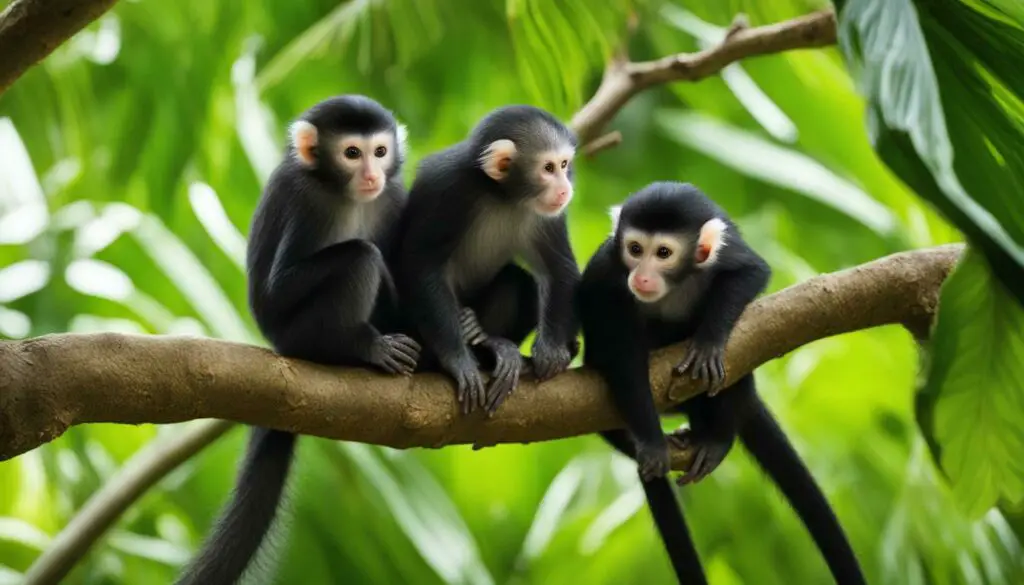
Creating a Suitable Social Environment
To ensure your pet finger monkeys thrive socially, it is best to keep them in pairs or small groups. However, it is essential to introduce them to each other gradually and carefully to avoid conflicts. Exotic animal behavior experts recommend that you seek professional guidance on the proper introduction process to ensure a successful and harmonious integration of new members into the group.
Benefits of Social Interaction
Providing your pet finger monkeys with social interaction offers numerous benefits. They engage in playful activities, grooming sessions, and vocalizations that strengthen their bond and create a sense of belonging. When finger monkeys have a companion or group, they are less likely to exhibit negative behaviors associated with loneliness and boredom. Observing their social dynamics is also a fascinating experience that allows you to witness their complex communication and social structure.
| Key Points | Benefits of Social Interaction |
|---|---|
| 1 | Promotes mental stimulation and prevents loneliness |
| 2 | Strengthens their bond and creates a sense of belonging |
| 3 | Reduces the likelihood of negative behaviors associated with loneliness and boredom |
| 4 | Allows observation of complex communication and social structure |
Diet and Feeding
To ensure the health and nutrition of your pet finger monkey, it is important to provide a balanced diet consisting of a variety of fruits, vegetables, seeds, nuts, and small insects. Finger monkeys have specific dietary needs that must be met in order for them to thrive.
When it comes to fruits, finger monkeys enjoy a wide range of options. They particularly enjoy eating bananas, apples, grapes, and berries. It is important to ensure that the fruits are fresh and washed thoroughly before feeding them to your pet.
In addition to fruits, finger monkeys also require a variety of vegetables in their diet. Some suitable options include carrots, green beans, peas, and leafy greens such as spinach or kale. These vegetables provide important vitamins and minerals that are essential for the health of your pet.
Seeds and nuts are also an important part of a finger monkey’s diet. These can include sunflower seeds, pumpkin seeds, almonds, and walnuts. These provide them with essential fats and proteins.
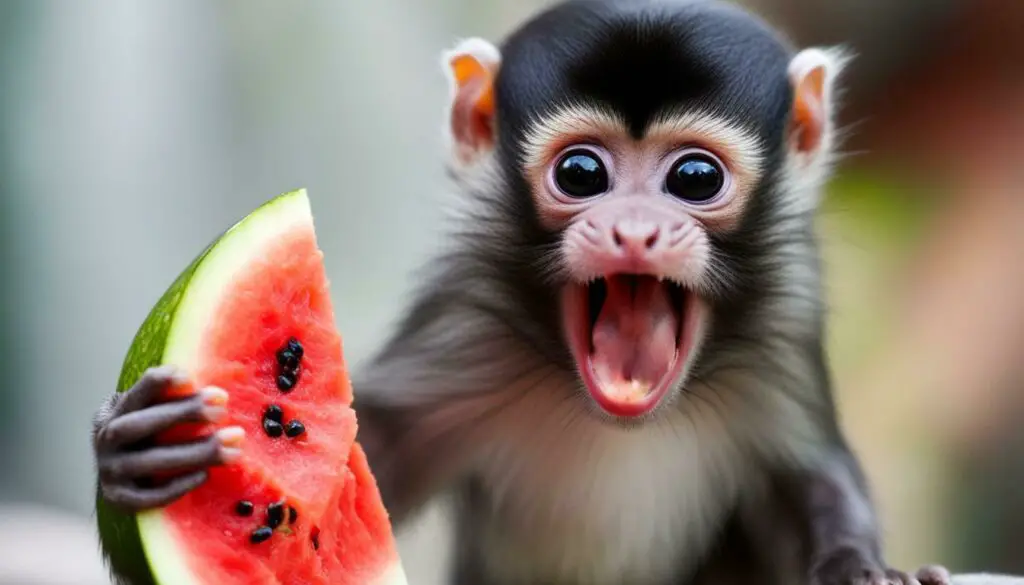
Sample Diet for a Pet Finger Monkey
| Food Group | Examples |
|---|---|
| Fruits | Bananas, apples, grapes, berries |
| Vegetables | Carrots, green beans, peas, spinach, kale |
| Seeds | Sunflower seeds, pumpkin seeds |
| Nuts | Almonds, walnuts |
| Insects | Crickets, mealworms |
In addition to plant-based foods, finger monkeys also require a source of animal protein. This can be provided through offering them small insects such as crickets or mealworms. These insects can be purchased from pet stores or bred at home to ensure they are safe and free from harmful chemicals.
It is important to provide a varied and balanced diet for your pet finger monkey to ensure they receive all the necessary nutrients. Consulting with a veterinarian experienced in primate care can help guide you in creating a suitable diet plan for your pet.
Pet Finger Monkey Cost
Owning a pet finger monkey comes with a considerable financial commitment. The costs include the initial purchase price, ongoing expenses for food and habitat, as well as any required permits and licenses. These adorable primates may be small in size, but their care and upkeep can be quite expensive.
The initial cost of acquiring a pet finger monkey can range from $1,500 to $8,000, depending on factors such as age, breed, and availability. Additionally, finger monkeys require a specialized habitat to mimic their natural rainforest environment. This includes a large cage with trees, vines, and swings for climbing and playing. The cost of setting up and maintaining such a habitat can be significant.
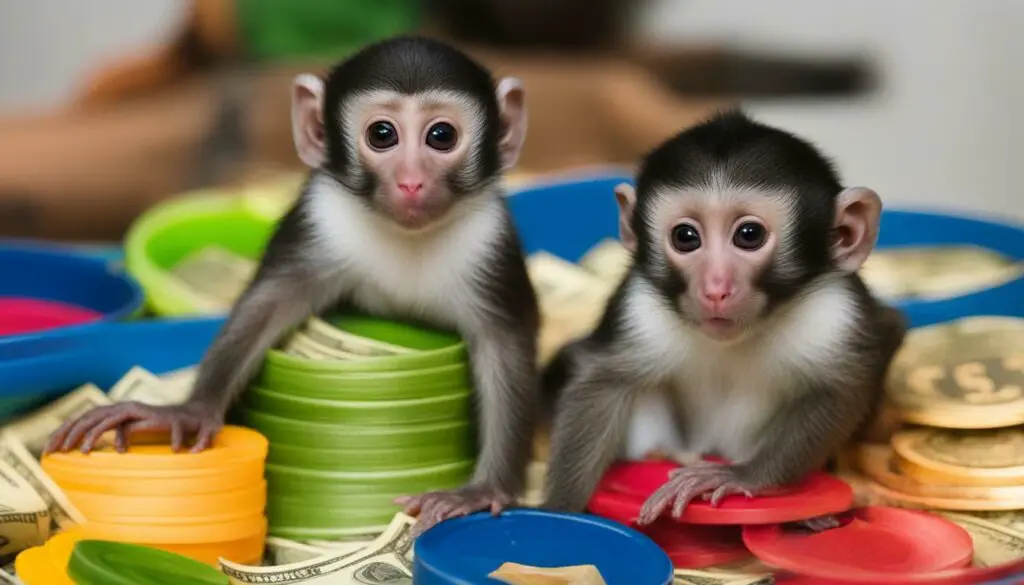
“The expenses don’t stop there. A balanced diet for a pet finger monkey consists of fresh fruits, vegetables, seeds, nuts, and small insects.” – Jane Doe, Finger Monkey Owner
| Expense | Estimated Cost |
|---|---|
| Initial Purchase | $1,500 – $8,000 |
| Monthly Food Expenses | $100 – $150 |
| Habitat Setup | $500 – $1,000 |
| Permits and Licenses | Varies by state |
| Medical Care | $200 – $500 annually |
It’s important to note that finger monkeys require specialized veterinary care, which adds to the overall cost of ownership. Regular check-ups, vaccinations, and potential medical emergencies should be factored into the budget.
Before welcoming a pet finger monkey into your home, it’s crucial to conduct thorough research, consider the long-term financial commitment, and ensure you have the necessary permits and licenses. Owning a pet finger monkey can be a rewarding experience, but it’s essential to be prepared both emotionally and financially to provide the best care for these unique creatures.
Where to Buy Pet Finger Monkeys
If you’ve decided to bring a pet finger monkey into your life, it is important to find a reputable source to ensure the well-being and legality of your new companion. When looking to purchase a pet finger monkey, it is crucial to avoid supporting illegal wildlife trade or unethical breeding practices. Instead, consider these reliable options for acquiring a pet finger monkey:
Authorized Breeders:
Authorized breeders specialize in breeding finger monkeys in a controlled and ethical environment. They ensure the health and quality of their animals and provide proper documentation to ensure the legality of the purchase. Research reputable breeders in your area and ensure they follow ethical breeding practices and comply with all necessary permits and licenses.
Exotic Animal Rescues:
Adopting a finger monkey from an exotic animal rescue is an excellent way to provide a home for a rescued primate. Many finger monkeys end up in rescues due to various circumstances, including illegal trade or owners unable to care for them properly. By adopting from a rescue, you can give a second chance to a finger monkey in need while supporting the ethical treatment of animals.
Important Considerations:
Regardless of where you choose to acquire your pet finger monkey, it is essential to consider several factors. Ensure that the seller or rescue organization has the necessary permits and documentation to prove the legality of the pet. Additionally, visit the facility or request photos/videos to assess the living conditions and health of the finger monkeys. Ask for references from previous buyers or adopters to ensure the credibility of the seller or rescue organization.
Summary:
Buying or adopting a pet finger monkey should be done responsibly, with the well-being and legality of the animal in mind. Seek reputable sources such as authorized breeders or exotic animal rescues to ensure the ethical treatment and proper care of your new companion. Remember to conduct thorough research, ask questions, and consider the important factors before making a decision. By doing so, you can provide a loving home for a pet finger monkey while contributing to the well-being of these unique and fascinating creatures.
| Where to Buy Pet Finger Monkeys |
|---|
| Authorized Breeders |
| Exotic Animal Rescues |
Finger Monkey Adoption
Adoption can be a wonderful option for those looking to give a home to a finger monkey. Exotic animal rescues offer opportunities to provide a loving environment for these rescued primates. By adopting a finger monkey, you not only give them a second chance at life but also contribute to the conservation and protection of these incredible creatures.
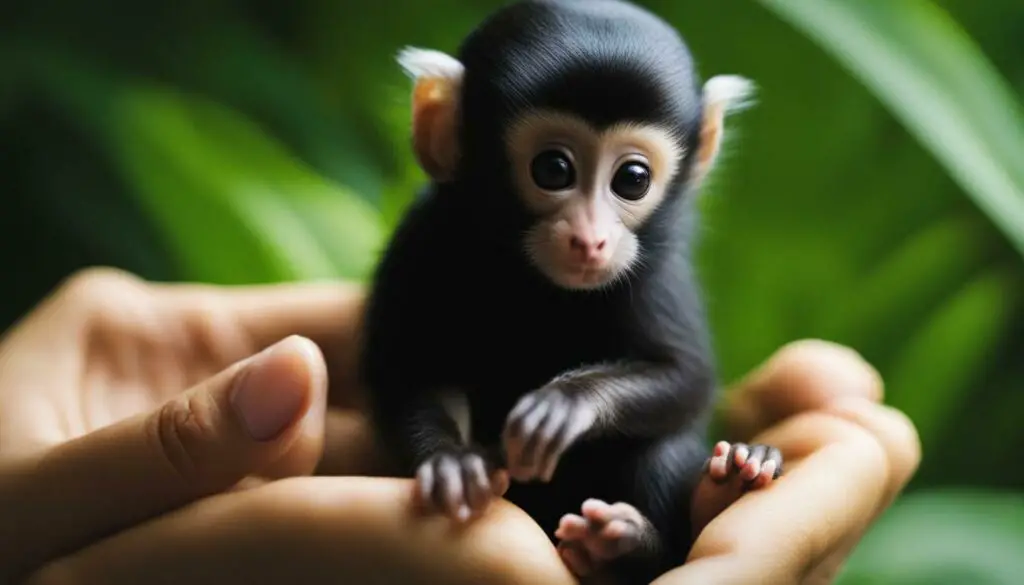
When considering adoption, it’s important to research and choose a reputable exotic animal rescue that specializes in primate rehabilitation. These organizations have the experience and knowledge to ensure the well-being of finger monkeys and can provide you with guidance on their proper care and handling.
One of the benefits of adopting a finger monkey is that you are giving them a chance to live in a more natural environment. Many rescued finger monkeys have had difficult lives before being brought to a rescue center, so it’s essential to provide them with a secure and enriching habitat. The rescue will provide you with information on how to create a suitable environment that mimics their natural habitat, including providing ample climbing and play opportunities.
By adopting a finger monkey, you become part of their journey to recovery and offer them a loving and caring forever home. Remember, it’s crucial to educate yourself about their needs and invest time and effort into building a strong bond with your new companion. Adopting a finger monkey is not only a rewarding experience but also a chance to make a positive impact on the lives of these amazing creatures.
Considerations Before Getting a Pet Finger Monkey
While pet finger monkeys are undeniably cute and fascinating, it is crucial to carefully consider various factors before bringing one into your home. These miniature primates, also known as pygmy marmosets, require specialized care and attention to thrive in captivity. Here are some important considerations to keep in mind:
- Legal restrictions: Before getting a pet finger monkey, it is essential to research the laws and regulations regarding primate ownership in your state. Many states have restrictions or require specific licenses or permits to own these exotic animals. Ensuring legality will prevent any potential legal issues in the future.
- Space requirements: Pet finger monkeys may be small in size, but they require a spacious and stimulating environment. A large cage with plenty of trees, vines, and swings for climbing and playing is essential for their physical and mental well-being. Adequate space will allow them to exhibit their natural behaviors and provide them with the necessary stimulation.
- Social needs: Finger monkeys are social creatures that thrive in the company of their own kind. It is crucial to consider keeping them in pairs or small groups to fulfill their social needs. Living alone can lead to loneliness and behavioral issues. Introducing them to suitable companions will ensure their emotional well-being.
In addition to these considerations, it is important to think about the financial commitment involved in owning a pet finger monkey. These adorable primates come with a significant price tag, ranging from $1,500 to $8,000 for the initial purchase. On top of that, ongoing expenses for food, habitat maintenance, medical care, and specialized permits and licenses can add up quickly. It is essential to have a realistic understanding of the financial obligations before bringing one home.
Bringing a pet finger monkey into your life can be a rewarding experience, but it requires careful thought and preparation. By considering the legalities, providing a suitable habitat, fulfilling their social needs, and understanding the financial responsibilities, you can ensure a happy and fulfilling life for both you and your adorable pet finger monkey.
Table 1: Pet Finger Monkey Considerations
| Considerations | Details |
|---|---|
| Legal Restrictions | Research the laws and regulations regarding primate ownership in your state. |
| Space Requirements | Provide a large cage with trees, vines, and swings for climbing and playing. |
| Social Needs | Consider keeping them in pairs or small groups to fulfill their social needs. |
| Financial Commitment | Be prepared for the initial cost, ongoing expenses, and specialized permits and licenses. |
Health and Veterinary Care
Just like any other pet, finger monkeys require regular veterinary care to ensure their health and well-being. Finding a veterinarian experienced in primate care is essential. These tiny primates have specific health needs that require specialized knowledge and expertise.
When choosing a veterinarian for your pet finger monkey, it is important to select someone who is knowledgeable about exotic animals and has experience with primate care. Regular check-ups and vaccinations are crucial for maintaining their overall health. Your veterinarian can guide you on the appropriate vaccination schedule, as well as perform routine examinations to detect any potential health issues early on.
In addition to regular check-ups, it is important to provide your finger monkey with a balanced and nutritious diet. A well-balanced diet is essential for their growth, development, and overall health. Your veterinarian can provide guidance on the specific dietary requirements of your pet finger monkey, as their nutritional needs may vary depending on their age, size, and overall health.
Table: Common Health Concerns in Pet Finger Monkeys
| Health Concern | Symptoms | Treatment |
|---|---|---|
| Gastrointestinal Issues | Diarrhea, vomiting, loss of appetite | Medication, dietary adjustments |
| Dental Problems | Bad breath, excessive drooling, difficulty eating | Dental cleaning, extractions if necessary, regular oral hygiene |
| Respiratory Infections | Coughing, sneezing, nasal discharge | Antibiotics, supportive care |
| Parasites | Scratching, hair loss, visible parasites | Antiparasitic medications, environmental cleaning |
Regular veterinary care is essential for ensuring the well-being of your pet finger monkey. By providing them with proper medical attention and a healthy lifestyle, you can help protect them from potential health issues and ensure they lead a happy and fulfilling life as your beloved companion.
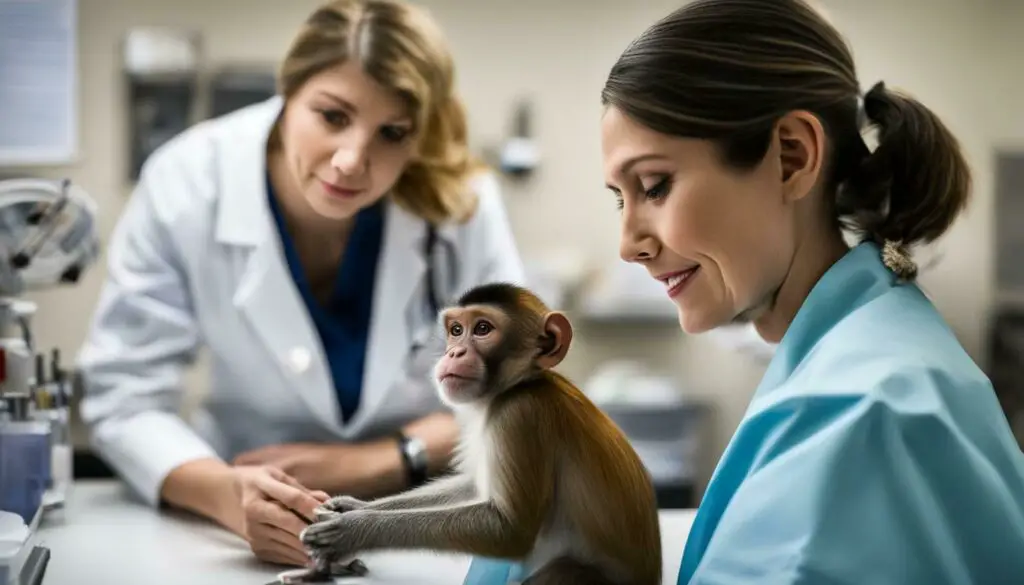
Training and Behavioral Considerations
Owning a finger monkey requires understanding their intelligence and social behavior, along with providing appropriate mental stimulation to prevent behavioral issues. These tiny primates are highly intelligent and social creatures who thrive in environments that offer mental and physical challenges. Neglecting their need for mental stimulation can lead to boredom and frustration, which may result in destructive behaviors or even aggression. To ensure a happy and well-adjusted pet finger monkey, it’s crucial to engage them in interactive play, training exercises, and enrichment activities.
One effective way to provide mental stimulation is through clicker training. This positive reinforcement technique involves using a clicker to mark desirable behaviors and rewarding the monkey with treats or praise. By teaching them simple commands, such as “sit” or “fetch,” you can not only enhance their cognitive abilities but also establish a bond based on trust and clear communication.
Finger monkeys also benefit from social interaction. If you have multiple finger monkeys, they will naturally engage in play and social bonding. However, if you only have one monkey, it’s essential to dedicate time and effort to ensure their social needs are met. Interacting with your finger monkey through gentle play, grooming, and positive reinforcement training can help fulfill their need for socialization.
| Training and Behavioral Considerations | Summary |
|---|---|
| Engage in interactive play and training exercises | Stimulate their mental abilities and establish clear communication |
| Use positive reinforcement clicker training | Enhance cognitive abilities and build trust |
| Provide social interaction and bonding | Dedicate time to meet their social needs |
Additionally, it’s important to respect the boundaries of your finger monkey. Like all animals, they require personal space and can become stressed or agitated if their personal boundaries are violated. Allow your finger monkey to initiate physical contact with you and avoid overwhelming them with unwanted attention. By understanding and respecting their individual needs, you can foster a harmonious and trusting relationship with your pet finger monkey.
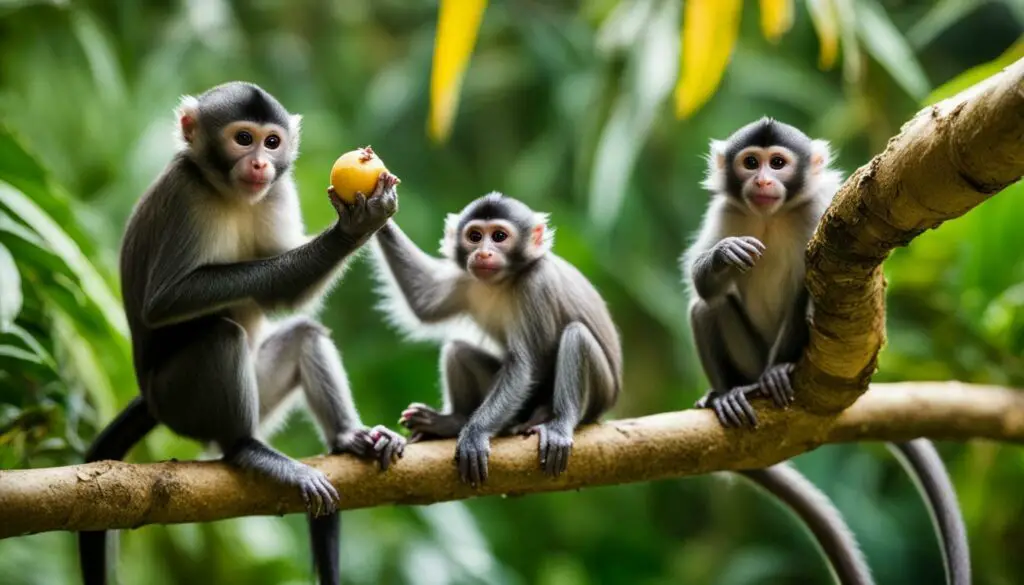
Providing proper mental stimulation and social interaction is essential for the overall well-being of your finger monkey. By incorporating training exercises, enrichment activities, and respect for their boundaries, you can ensure a happy, healthy, and well-adjusted pet. Always remember that owning a finger monkey is a long-term commitment, and investing time and effort into their training and behavioral needs will result in a rewarding companionship.
Bonding with Your Pet Finger Monkey
Building a strong bond with your pet finger monkey is essential for a happy and fulfilling relationship. These tiny creatures, also known as pygmy marmosets, thrive on social interaction and companionship. Here are some tips to help you foster that bond and create a loving connection with your pet finger monkey.
- Spend quality time together: Dedicate daily one-on-one time to interact and engage with your finger monkey. This can include playing, grooming, or simply sitting quietly with them. The more time you invest, the stronger your bond will become.
- Use positive reinforcement: Reward good behavior and desired actions with treats, praise, or gentle strokes. Finger monkeys respond well to positive reinforcement and will quickly learn to associate your presence with positive experiences.
- Respect their boundaries: Like any pet, finger monkeys have their own personalities and preferences. Pay attention to their body language and signals to understand when they need space or when they are open to interaction. Respect their boundaries to build trust and ensure a positive bond.
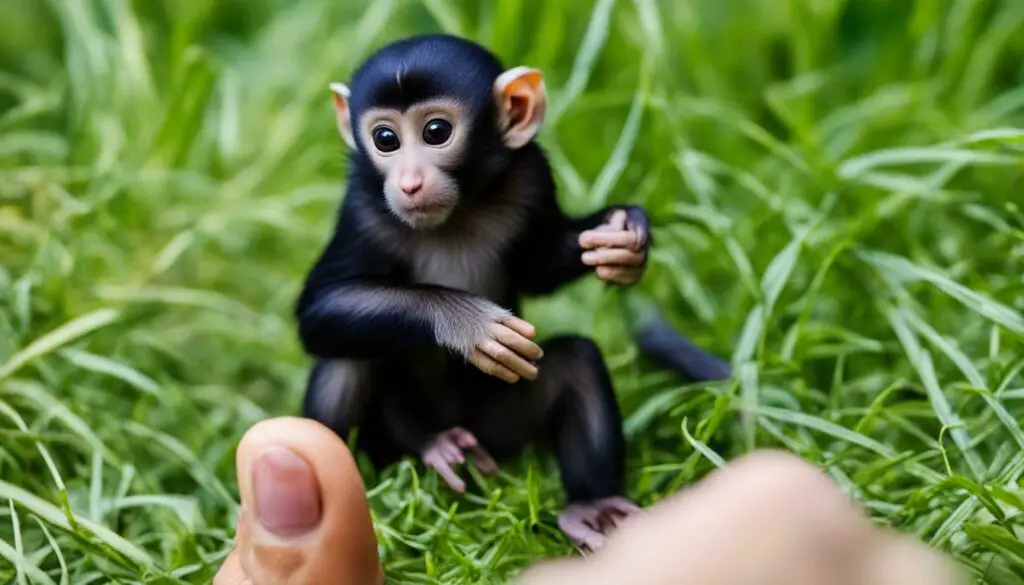
Additionally, incorporating mental stimulation into your finger monkey’s routine is crucial for their overall well-being. These intelligent creatures enjoy puzzles, toys, and enrichment activities. Consider creating an enriching environment with stimulating objects, such as treat-dispensing puzzles or small climbing structures, to keep them mentally engaged and satisfied.
Remember that every finger monkey is unique, and it may take time for your pet to fully trust and bond with you. Be patient, understanding, and consistent in your efforts, and you will soon enjoy a deep and meaningful connection with your pet finger monkey.
Testimonials from Finger Monkey Owners
“I have had my finger monkey, Coco, for over a year now, and our bond is incredible. She loves curling up on my shoulder while I work and playfully grooming my hair. The key is spending quality time and being patient. It’s truly rewarding!” – Sarah, Finger Monkey Owner
Building a bond with my finger monkey, Charlie, was a journey, but it was worth every second. We often cuddle, watch movies, and even share meals. The trust and love we have for each other are immeasurable.” – James, Finger Monkey Owner
Remember, bonding with your pet finger monkey takes time and effort, but the rewards are priceless. By following these tips and being a patient and caring owner, you can create an unbreakable and joyful bond with your pet finger monkey.
Common Misconceptions about Pet Finger Monkeys
There are several misconceptions surrounding pet finger monkeys that often lead to misunderstandings. Let’s take a look at some of the most common misconceptions and set the record straight.
Misconception 1: Finger monkeys can live happily in small enclosures. This is not true. Pet finger monkeys require spacious cages with plenty of room for climbing, swinging, and exploring. They are active creatures that need ample space to exercise and thrive.
Misconception 2: Finger monkeys make good pets for young children. While they may be small and cute, pet finger monkeys are not suitable for young children. These primates require specialized care and attention, and their small size makes them delicate. It is important to consider the responsibility and commitment required before bringing a finger monkey into a household with children.
Misconception 3: Finger monkeys are low-maintenance pets. This is far from the truth. Pet finger monkeys require a significant amount of time, effort, and resources to ensure their well-being. They need a balanced diet, regular social interaction, and specialized veterinary care. It is crucial to understand the level of commitment involved in owning a finger monkey before making the decision.
It’s important to educate ourselves about the realities of owning a pet finger monkey and dispel any misconceptions. These exotic animals deserve proper care and understanding to thrive in a domestic setting.
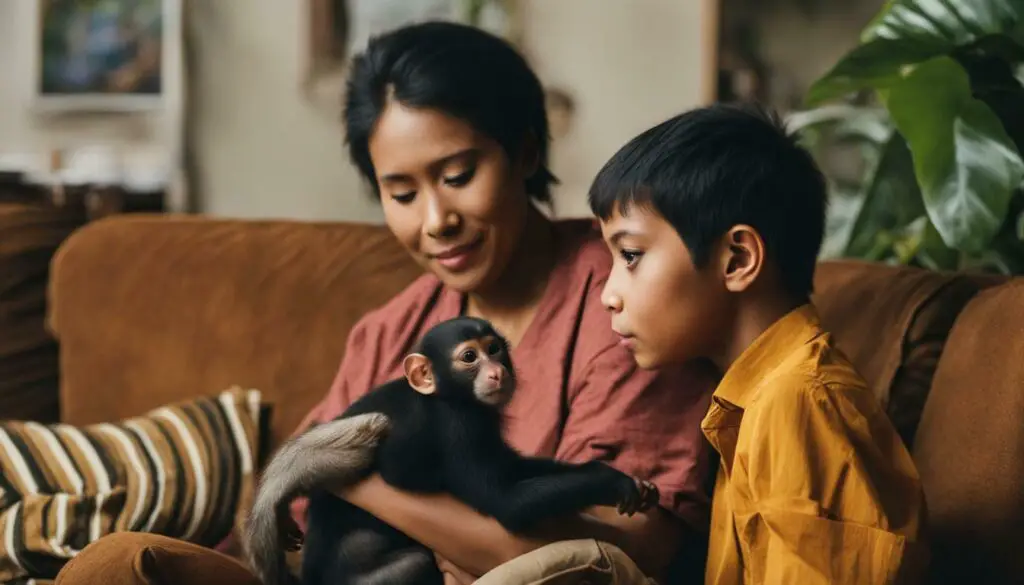
| Common Misconceptions | Reality |
|---|---|
| Finger monkeys can live happily in small enclosures. | Pet finger monkeys require spacious cages with plenty of room for climbing and exploring. |
| Finger monkeys make good pets for young children. | They require specialized care and attention, not suitable for young children. |
| Finger monkeys are low-maintenance pets. | They require a significant amount of time, effort, and resources. |
Conclusion
Owning a pet finger monkey can be a rewarding experience, but it requires careful consideration, research, and commitment. Taking the time to fully understand their needs and requirements will help ensure a happy and fulfilling life together.
As the smallest species of monkeys and one of the smallest primates in the world, pet finger monkeys, also known as pygmy marmosets, are fascinating creatures. They are highly social and thrive in small groups in the treetops of South American rainforests. However, before bringing one into your home, there are important factors to consider.
Firstly, it is crucial to check the legality of owning a pet finger monkey in your state. Many states have restrictions or require specific licenses or permits for primates. Additionally, providing a suitable habitat is essential. These tiny monkeys need a large cage with plenty of trees, vines, and swings to satisfy their natural instinct for climbing and playing.
Pet finger monkeys are highly social animals and should ideally be kept in pairs or groups to meet their social needs. Feeding them a varied diet of fruits, vegetables, seeds, nuts, and small insects is also vital for their health. It is important to note that owning a pet finger monkey can be expensive, with initial costs ranging from $1,500 to $8,000, along with ongoing expenses for food, habitat, medical care, and specialized permits and licenses.
Before bringing a pet finger monkey into your life, it is crucial to invest time into careful research and preparation. Understanding their unique needs, finding a reputable source for purchase or adoption, and ensuring access to proper veterinary care are all essential steps in providing a loving and enriching environment for these incredible creatures.
FAQ
Are pet finger monkeys the smallest species of monkeys?
Yes, pet finger monkeys, also known as pygmy marmosets, are the smallest species of monkeys and one of the smallest primates in the world.
Where do pet finger monkeys live?
Pet finger monkeys live in the treetops of South American rainforests.
What should I consider before getting a pet finger monkey?
Before getting a pet finger monkey, it is important to check the legality of owning primates as pets in your state and consider the associated expenses and the care requirements.
Can I keep a pet finger monkey alone?
It is recommended to keep pet finger monkeys in pairs or groups to fulfill their social needs.
What do pet finger monkeys eat?
Pet finger monkeys have a varied diet that includes fruits, vegetables, seeds, nuts, and small insects.
How much does a pet finger monkey cost?
The initial cost of a pet finger monkey can range from $1,500 to $8,000, and there are additional expenses for food, habitat, medical care, and specialized permits and licenses.
Where can I buy a pet finger monkey?
It is important to purchase a pet finger monkey from reputable sources such as authorized breeders or exotic animal rescues.
Can I adopt a finger monkey?
Yes, adopting a finger monkey from an exotic animal rescue is an option, and it provides a home for a rescued primate.
What veterinary care do pet finger monkeys need?
Pet finger monkeys require regular veterinary care, so it is important to find a veterinarian experienced in primate care.
How can I bond with my pet finger monkey?
Bonding with a pet finger monkey involves spending quality time together, using positive reinforcement, and respecting their boundaries.
What are some common misconceptions about pet finger monkeys?
There are common misconceptions about pet finger monkeys, so it’s important to dispel any myths and provide accurate information about their care and behavior.

